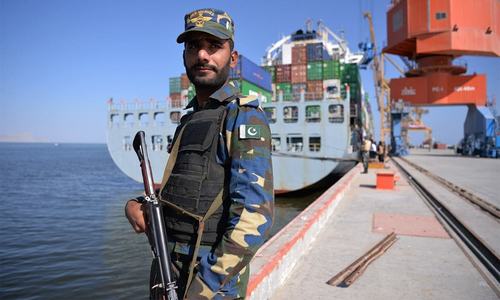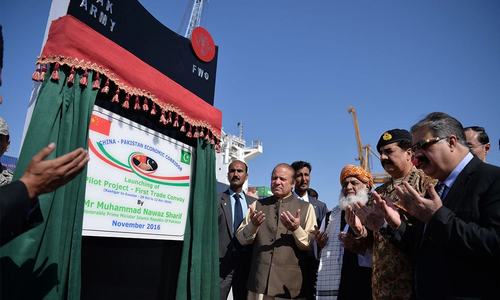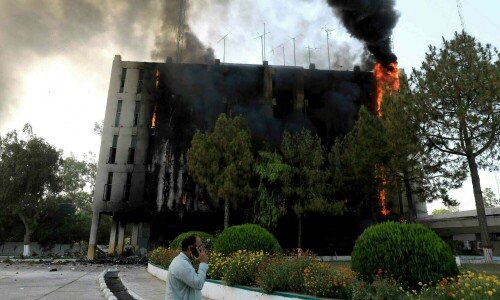
GIVEN its magnitude, the China-Pakistan Economic Corridor (CPEC) remains the subject of considerable debate in the country, with several experts weighing in with their figures of how much the $50 billion-plus projects are going to eventually cost Islamabad.
Over a 30-year repayment period, these figures, which do not differ wildly from one another, put the cost of CPEC at around 4.5 to five per cent per year. This means Pakistan will have to repay the $50bn plus interest at around $3bn to $3.5bn a year for the period.
Experts are right in asking whether the projected growth in economic activity as a result of CPEC generate enough national wealth for the country to service and repay annually for 30 years what seems not an insignificant amount of money, totalling about $90bn.
The Sri Lankan example has also been pointed out, where a large Chinese investment did not necessarily generate enough income or revenues for Colombo to successfully service the debt. This led to erosion of ownership of key assets such as a seaport and loss of ‘sovereignty’ over some 15,000 acres (6,070 hectares) of land earmarked for an industrial zone.
The benefits of this investment can only be accurately assessed if its impact on terrorism can be calculated.
Apart from raising the matter of annual cost, my Dawn colleague Khurram Husain, with an enviable grasp over economic and business issues, has also highlighted the matter of ‘exclusive’ economic zones for Chinese companies along the corridor and asked whether such exclusivity is desirable from the Pakistani point of view.
Social media has taken this debate to a different level altogether, where some analysts have asked if the large sums to be repatriated mean that China may come to represent in Pakistan in the 21st century what the East India Company was to India in the 19th.
Examine: CPEC is not another East India Company. Here's why
Whether this argument is valid or alarmist I will leave to the reader. What I do wish to say is that there can be no denying that Pakistan, with its huge defence and debt-servicing allocation, has very little left over for infrastructure development.
And it is also not rocket science to say that an economy can only grow to a point with poor or obsolete and creaky infrastructure in this day and age, and no more. Nawaz Sharif critics may deride the prime minister for being obsessed with building multi-lanes motorways. But they will also acknowledge that even with the major ports in the country, the road and rail infrastructure along the north-south axis exists more or less in a time capsule.
This may have been expanded but nowhere near the needs of a country with a population of 200 million. One need only drive from Karachi to Peshawar, for example, or take a train to understand how little has been done in any real way since the colonial plunderers left over 70 years ago.
Also important is to examine how many investors were prepared to sink in the required investment of the magnitude that the Chinese are pledging. China’s imperative for doing so is clear as its western part lags in the pace of development attained by the rest, particularly its east.
CPEC provides western China with a quick connection, access to the rest of the world via Pakistan and, therefore, it is sinking in what from Islamabad’s perspective is an unimaginably huge investment.
However, for any cost-benefit analysis of this investment to be all-encompassing and meaningful it needs to include factors generally excluded from such analyses. The benefits of this investment can only be accurately assessed if its impact on religious militancy, even terrorism, can be calculated.
The Chinese have long been concerned with the extremist Islamic movement in the western reaches of the People’s Republic and also understand where some of its own militants find common cause, go and train themselves only to return and cause unrest.
Sources say the Chinese leadership has repeatedly raised this issue with both civilian and military leaders in Pakistan. Although they have found sympathetic ears, they also realise that this is one area where the civilians’ ability to deliver is very limited.
Against the backdrop of newly shaping realities in the region, where India sees itself as equal to China regionally (of course with Washington’s encouragement), the Chinese leadership is moving closer to Pakistan, particularly in military cooperation.
As western sources of armaments appear more and more challenging and expensive for Pakistan, its reliance on China is increasing. Latest reports in the media suggest a deeper commitment between the two to enhanced defence production, among other areas.
Who would have been surprised to see the photo of Chief of Army Staff General Qamar Javed Bajwa meeting his counterparts in the People’s Liberation Army high command? But the fact that he also met the foreign minister for face-to-face talks is significant.
One can (and with justification) just focus again on the civil-military balance in the country’s power structure, or perhaps look at a wider, global perspective and its impact on us. To me, the only institution in the country capable of taking religious extremism and terrorism head-on is the army.
After all, for years and years, GHQ has nurtured and used such elements to project its power beyond our borders and considered them as a second line of defence for our nuclear-armed country. In the process we have all witnessed the disaster that has unfolded.
If it takes Chinese persuasion to convince our key decision-makers that it may have been a bad idea all along and, in any case, that it is definitely not viable any longer, it would be a huge, possibly incalculable, benefit of CPEC. Who would not welcome it?
The writer is a former editor of Dawn.
Published in Dawn, March 18th, 2017















































